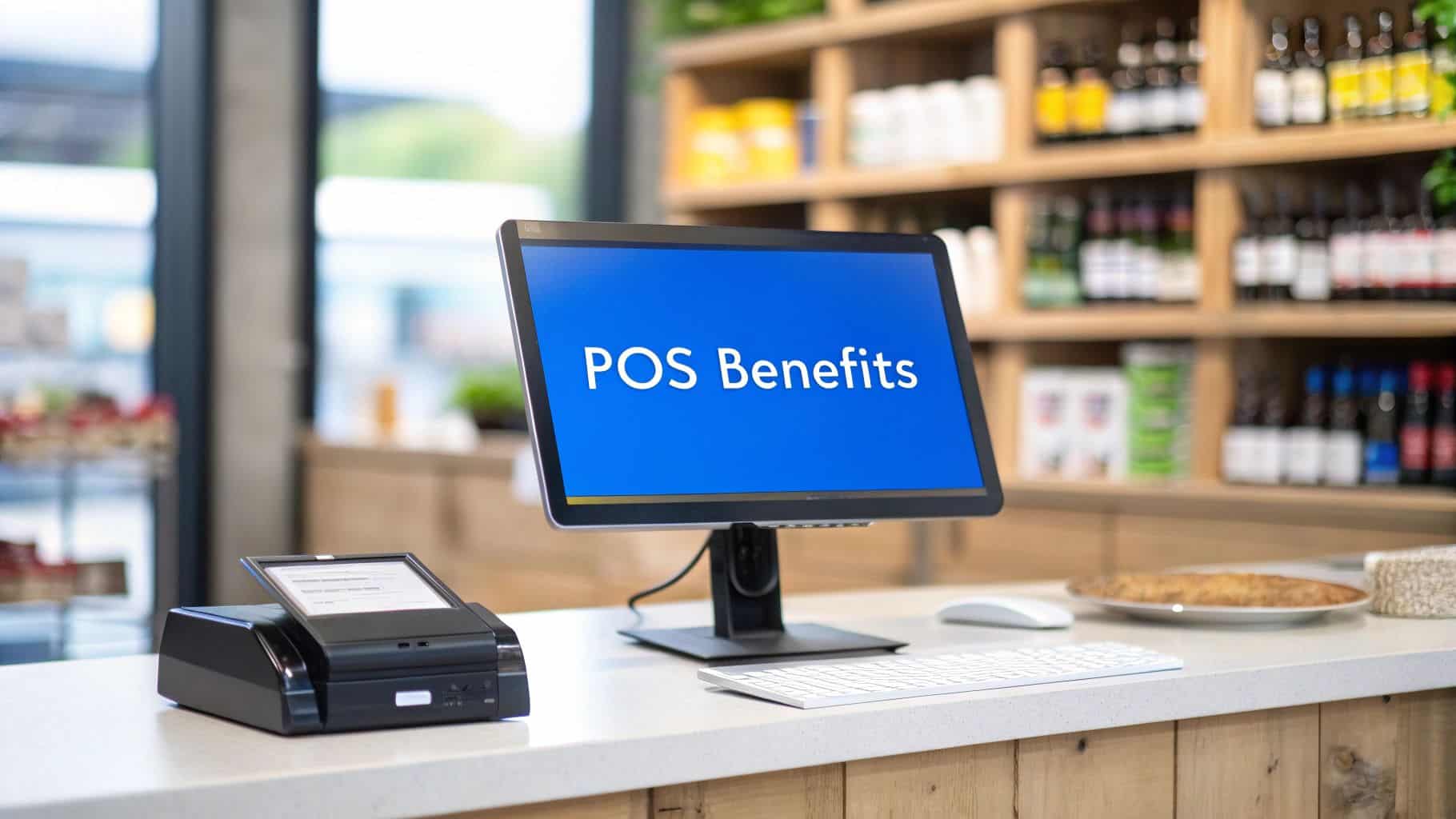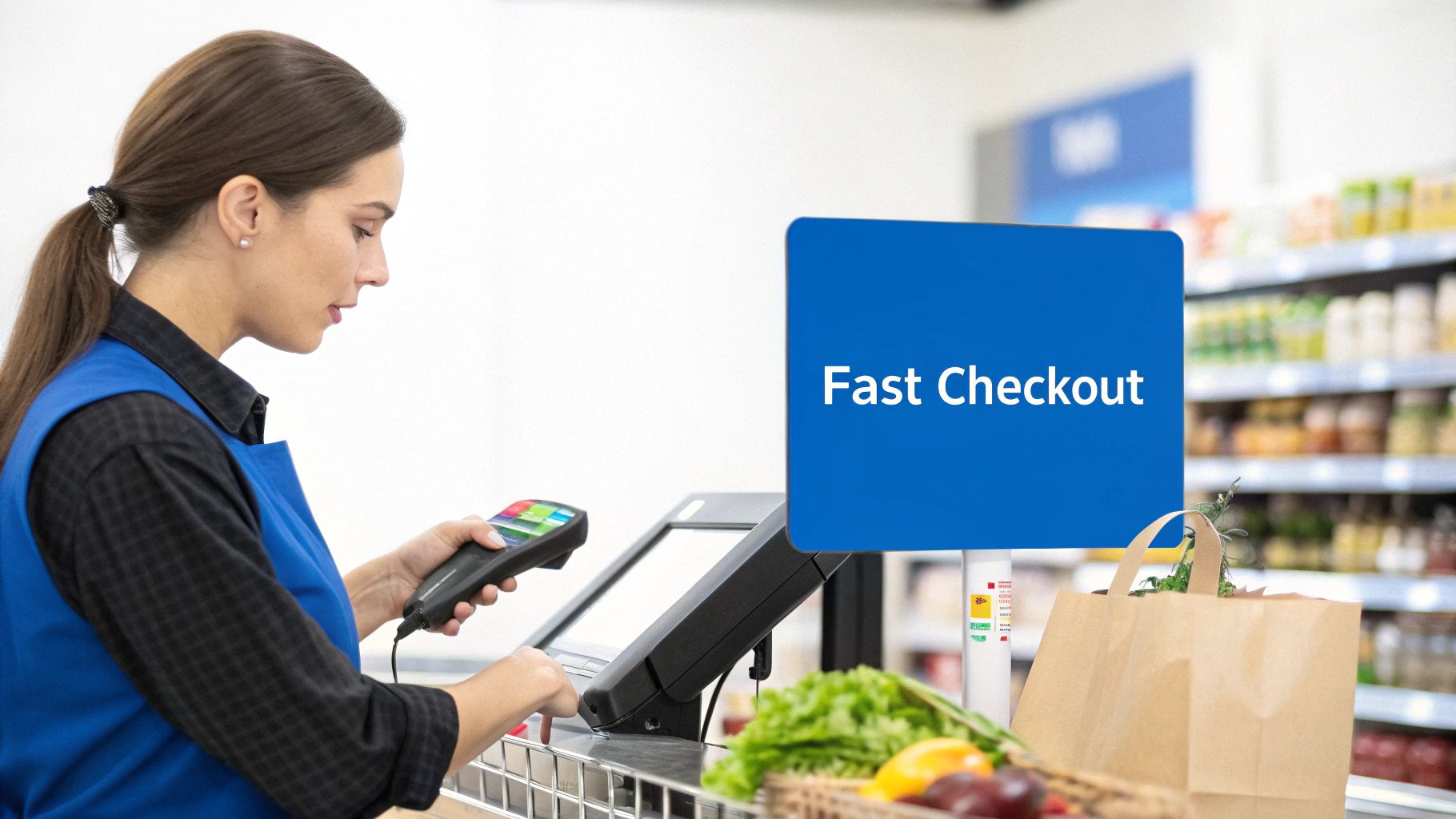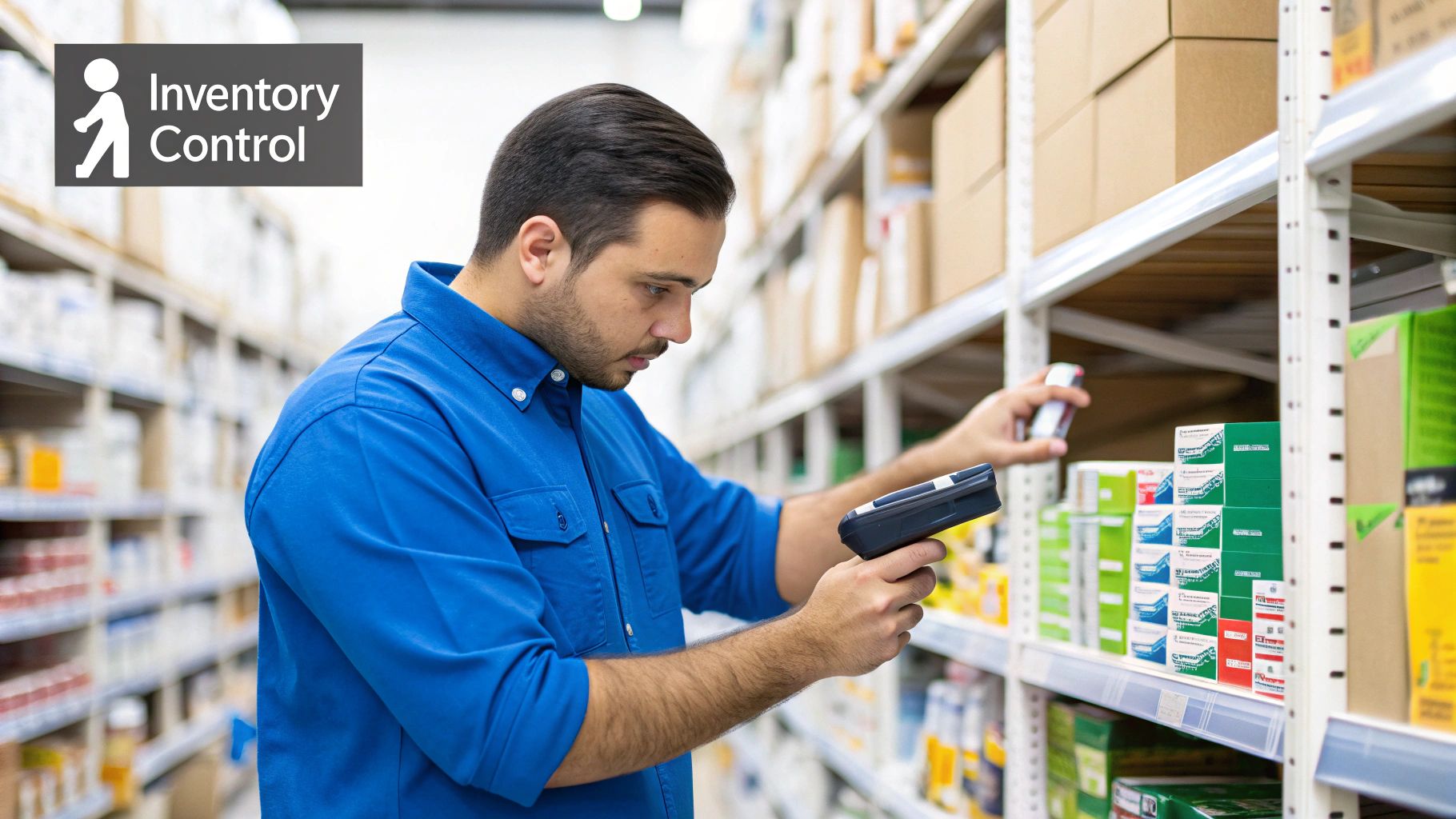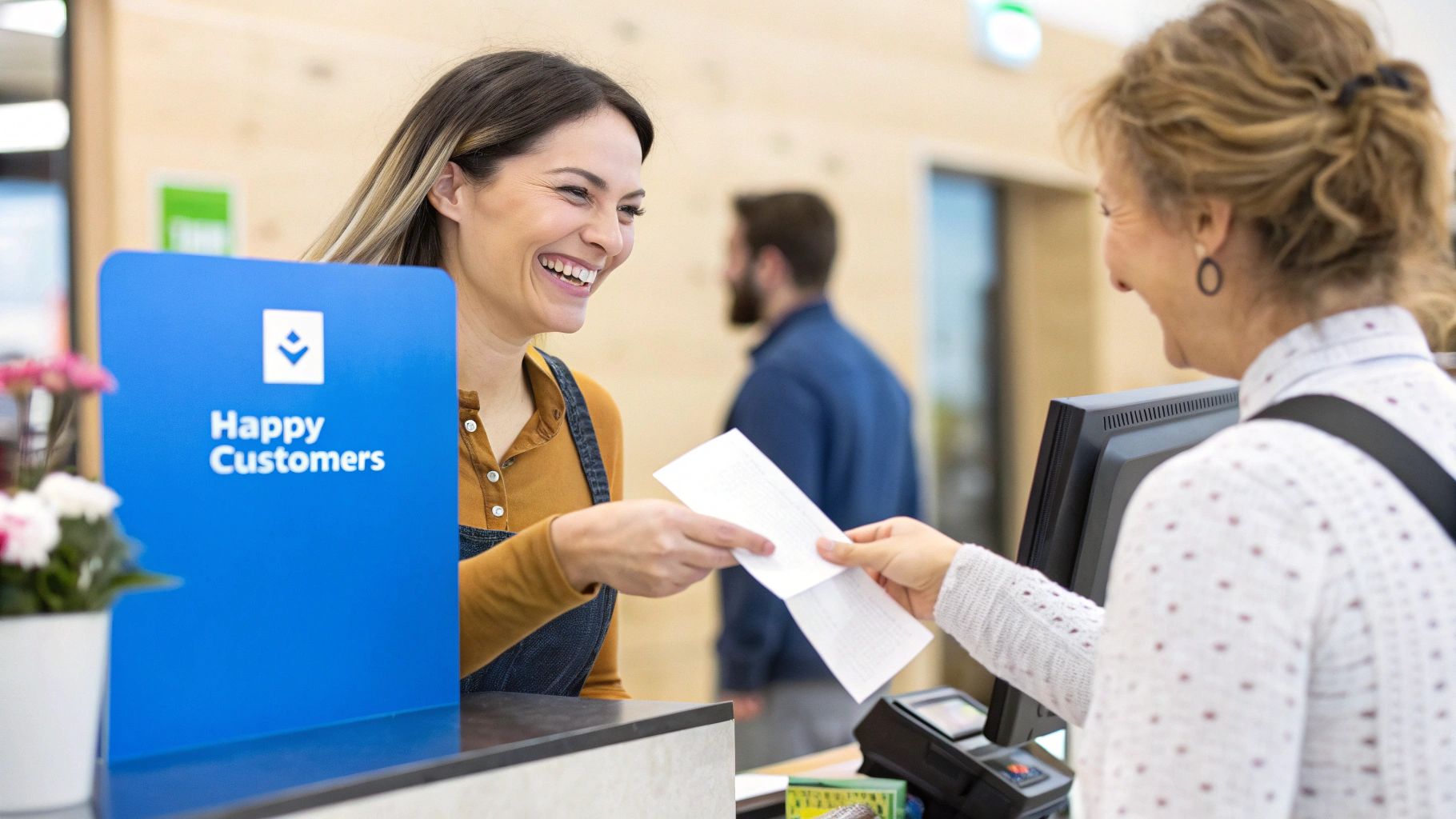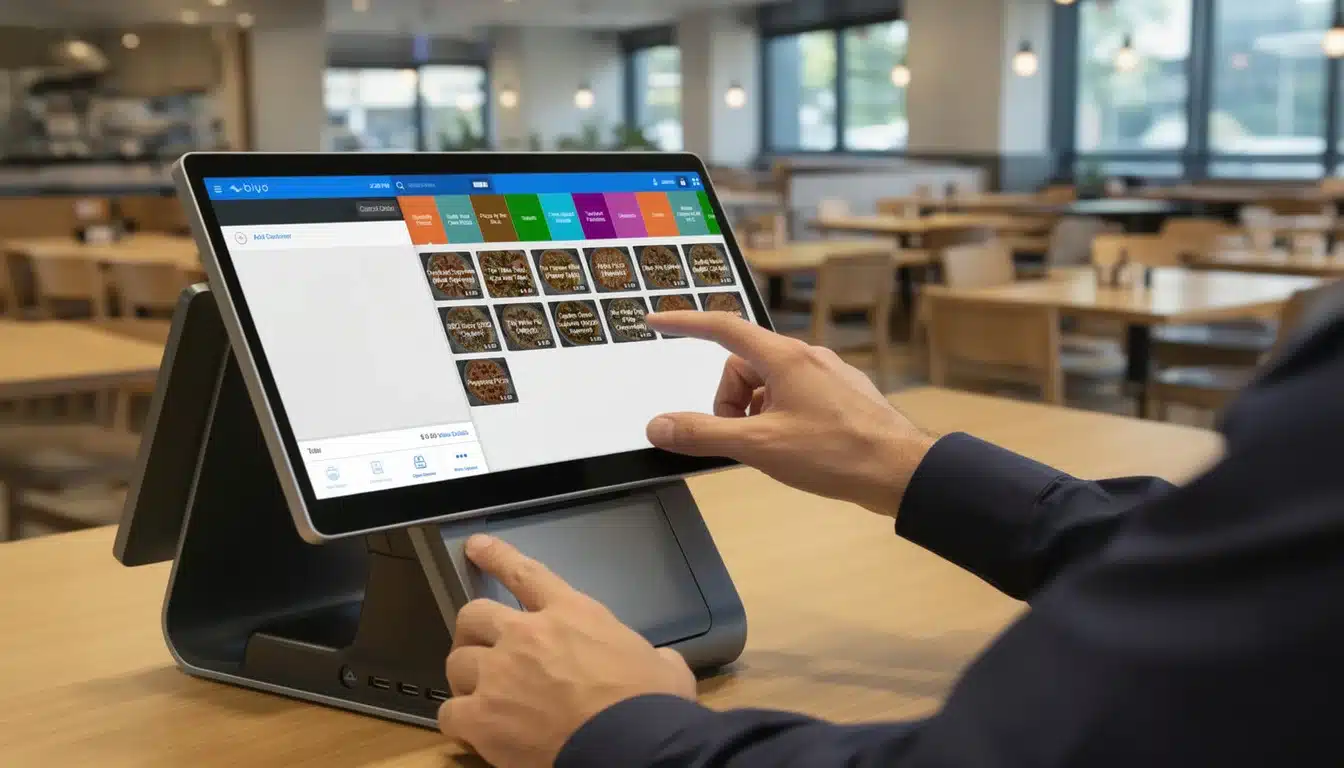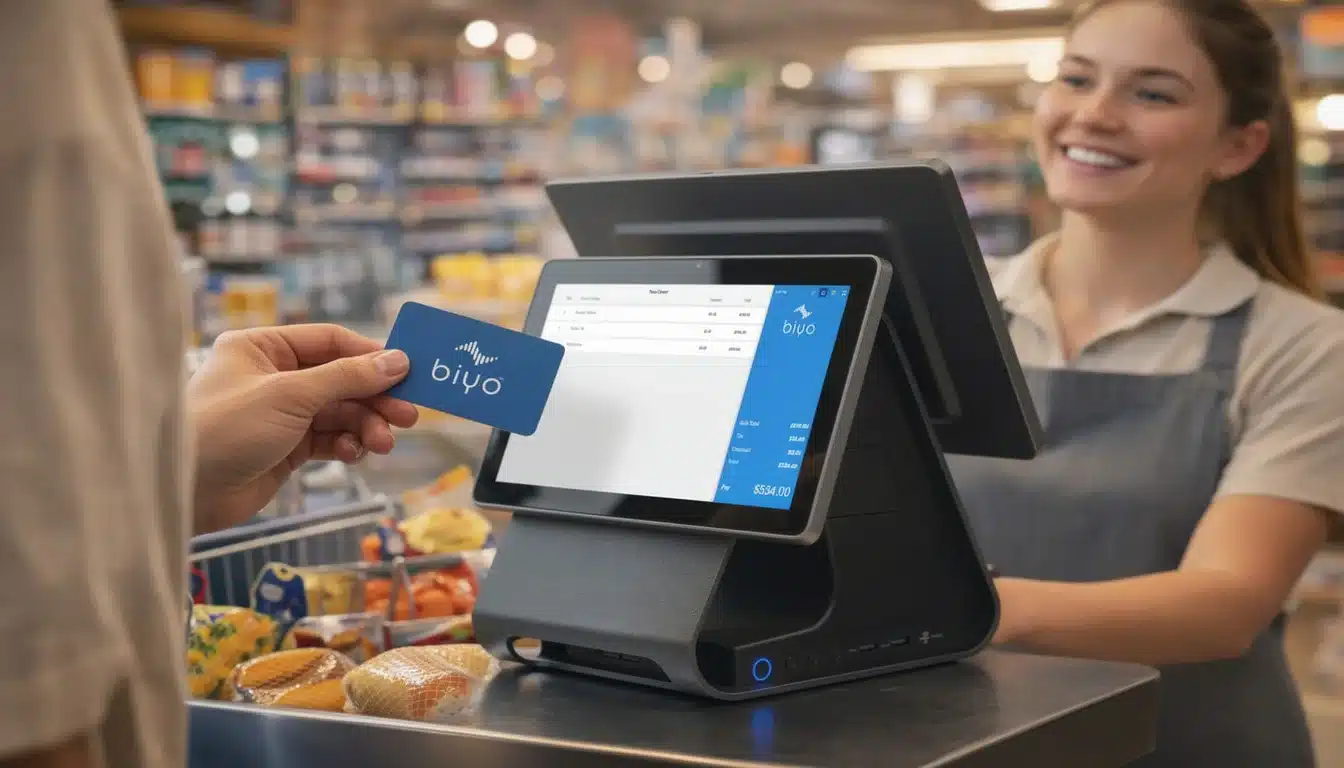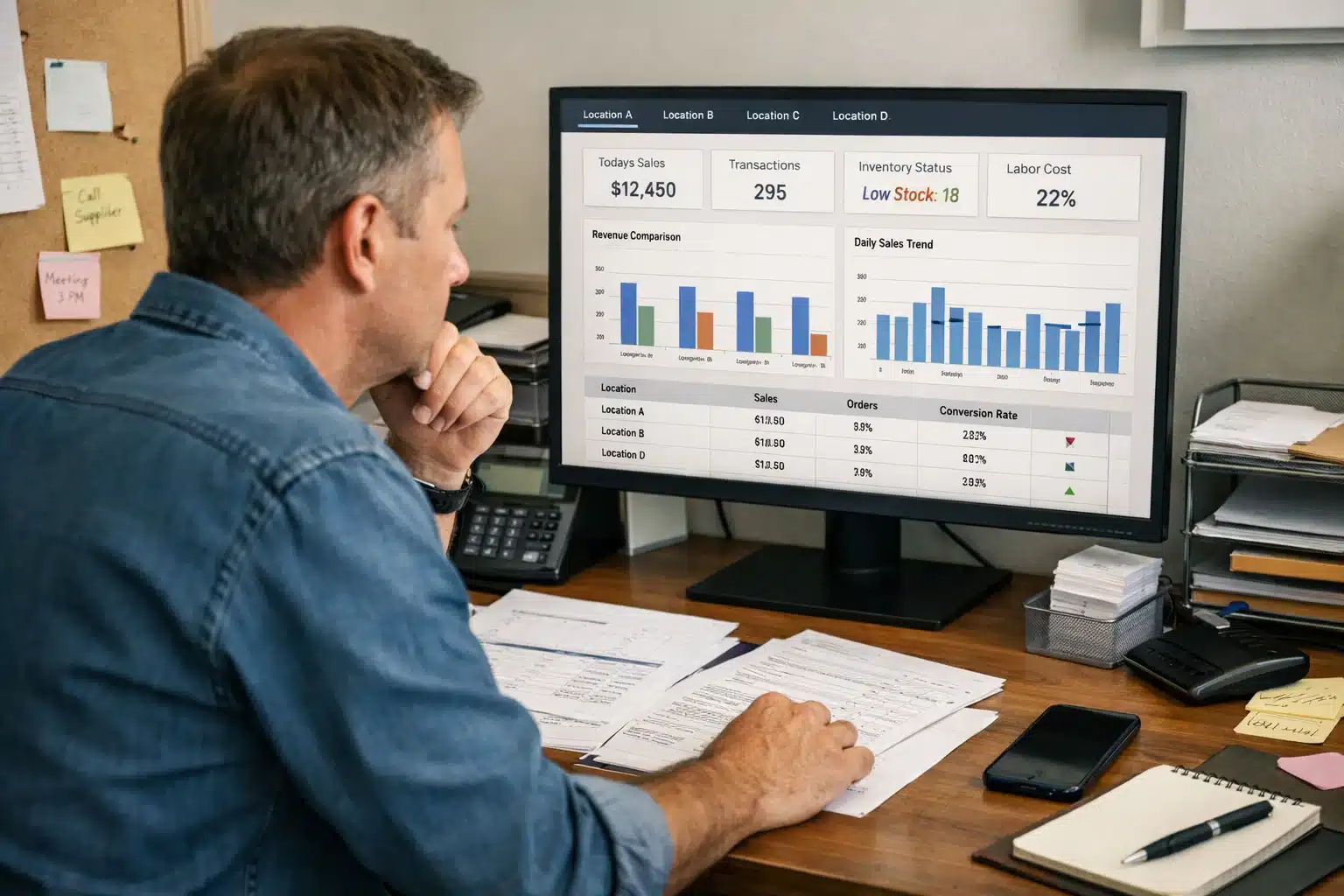When you boil it down, the real magic of a POS system is how it boosts your efficiency, gives you airtight control over your inventory, and hands you the kind of sales data you need to make truly smart business decisions. It turns a simple sale into a goldmine of information, simplifying everything from the checkout line to building customer loyalty.
Move Beyond The Cash Register With A Modern POS
Remember the old flip phone? It made calls, and that was about it. A traditional cash register is a lot like that—it does one job. A modern Point of Sale (POS) system, on the other hand, is like the latest smartphone in your pocket. It's not just for taking payments; it's the command center for your entire operation. This huge jump in capability is exactly why so many businesses are leaving their old cash drawers behind.
This isn't just a local trend; it's a global shift in how business gets done. The demand for faster, more accurate, and connected ways to handle transactions has fueled massive growth. By 2022, China was leading the charge with around 46.8 million POS terminals, and the United States wasn't far behind with 23 million. That's a whole lot of hardware supporting modern commerce.
The Central Hub For Your Business
Think of a modern POS as the nervous system of your business. It connects all the critical functions that you used to have to manage with separate, clunky tools. Instead of trying to make your sales reports talk to your stock lists and your customer database, a POS system brings it all together in one place.
This infographic really nails the core benefits, showing how a modern POS impacts your efficiency, inventory, and customer happiness.
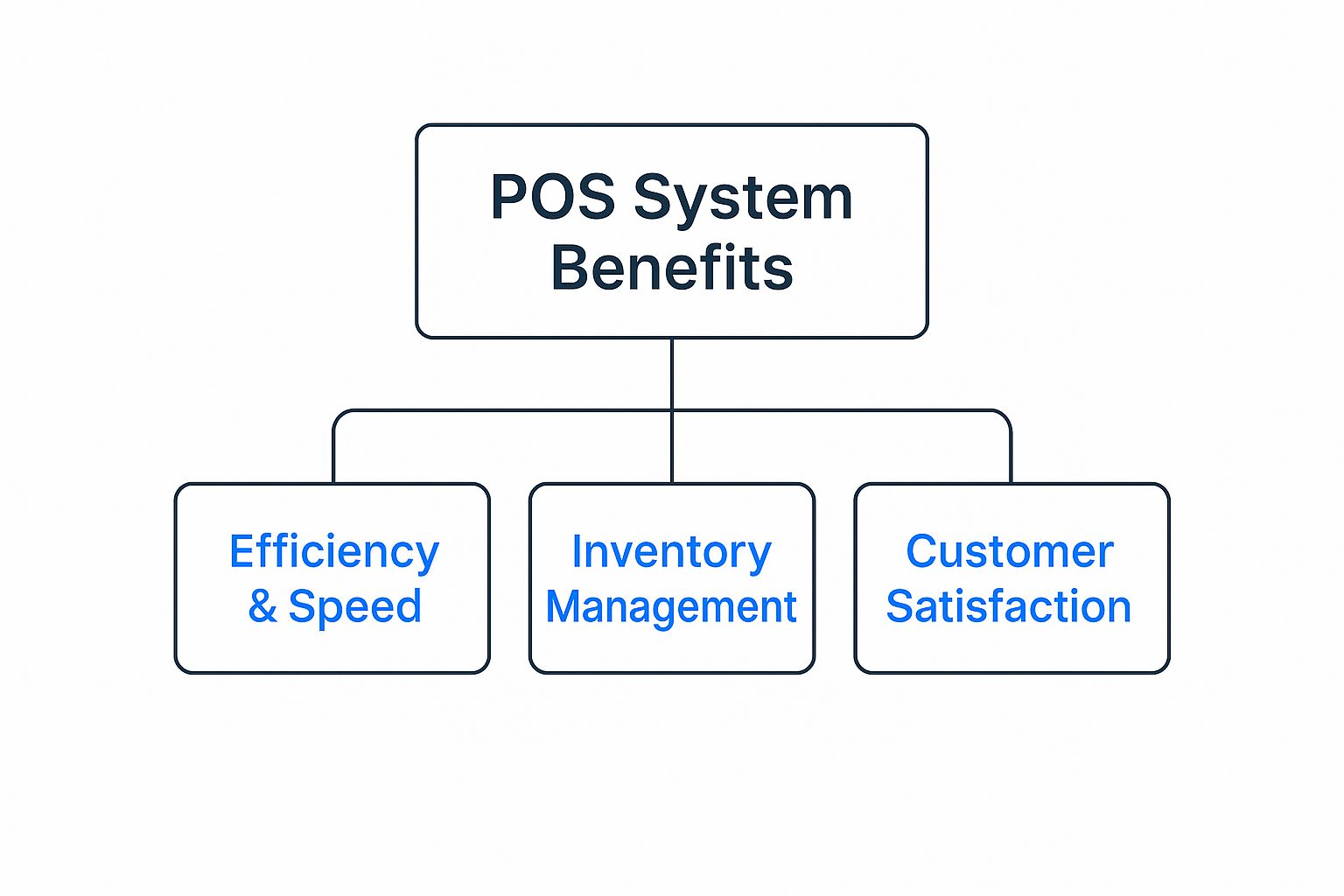
You can see how these three areas all work together, with the POS system acting as the foundation that holds everything up.
To really see the difference, a side-by-side comparison makes it crystal clear.
Traditional Cash Register vs Modern POS System At a Glance
| Feature | Traditional Cash Register | Modern POS System |
|---|---|---|
| Core Function | Calculates sales and holds cash | Processes sales, manages inventory, tracks customers, runs reports |
| Inventory Tracking | Manual pen-and-paper or separate software | Real-time, automatic updates with every sale |
| Sales Reporting | Basic end-of-day totals (Z-report) | Detailed analytics on best-sellers, peak hours, and trends |
| Customer Management | None | Builds customer profiles, tracks purchase history, manages loyalty programs |
| Payment Types | Primarily cash and basic card swipes | Accepts credit/debit, NFC (Apple Pay), gift cards, and online payments |
| Integration | Standalone device | Connects to accounting software, e-commerce platforms, and marketing tools |
| Accessibility | On-site only | Cloud-based access from anywhere, on any device |
The table really drives home the point: a POS system isn't just a better cash register; it's a completely different class of tool designed for growth.
From Manual Tasks To Automated Success
The real power of a POS is how it automates and simplifies your daily grind. It's a strategic investment that gives you a complete, up-to-the-minute view of your business's health. By taking over the tedious jobs, it frees you up to focus on what really matters—growing your business and taking care of your customers.
For many owners, learning more about what a cloud-based POS system is is a great next step, as it opens up even more flexibility. As you start planning for this kind of upgrade, it's also smart to look into your financing options for new business equipment to make the transition smooth.
Streamline Your Operations and Boost Efficiency
Picture your business at its peak hour—the lunch rush, the weekend swarm. A modern point-of-sale system works like your most reliable employee, taking over the repetitive tasks that create bottlenecks and letting your team shine where it counts: with your customers. This isn't just about swiping cards faster; it's about rewiring your entire workflow for the better.
One of the biggest wins is simply cutting down checkout times and getting rid of those daily administrative headaches. For example, if a popular pastry sells out, a busy café can update the menu on every single terminal instantly. No more telling customers you're out of their favorite item, no more holding up the line. That's a huge deal when you realize that long waits can convince up to 75% of customers never to come back.
Automate Tasks and Reduce Human Error
Let's be honest, manual work is a breeding ground for mistakes. It could be a cashier punching in the wrong price or a server mishearing an order. These little slip-ups seem minor, but they chip away at your profits and can frustrate customers. A good POS system digitizes these weak spots.
Take a retail store handling a return. Instead of fumbling through a manual refund and hoping the math is right, an employee just scans the receipt, and the system does all the heavy lifting in a flash. That kind of speed and accuracy is exactly what creates a smooth, professional customer experience.
By automating routine tasks, a POS system minimizes the risk of human error in manual entries, ensuring every order and transaction is recorded accurately. This precision is foundational to operational efficiency.
And this automation doesn't just stop at the counter. It creates a domino effect of efficiency across your entire team.
Simplify Staff Management
Modern systems, like Biyo POS, often come packed with features that take the pain out of managing your team. It's time to say goodbye to crumpled paper schedules and messy timesheets for good.
Here’s a look at how a POS can help with employee management:
- Integrated Time Tracking: Staff can clock in and out right on the terminal. This creates a perfect, undeniable record of their hours, making payroll accurate and fair every single time.
- Performance Monitoring: Because sales data is tied to individual employees, you can easily spot your star performers and see who might benefit from a bit more coaching. It's a clear way to build a stronger, more capable team.
- Simplified Tip Distribution: In a restaurant or café, the POS can calculate and split tips automatically. This removes any guesswork, ensures everything is transparent, and keeps your team happy.
At the end of the day, these efficiency gains aren't just about shaving a few minutes off a task. They add up to a dramatically better experience for everyone. When your operations run smoothly, your staff is less stressed, service is quicker, and customers walk away with a smile—a winning formula for any business.
Get a Perfect Handle on Your Inventory
Trying to guess what’s in your stockroom is a sure-fire way to lose sales and waste money. Let's be honest, it’s a constant headache. But what if you could have X-ray vision into your inventory? That’s one of the biggest wins a modern POS system gives you. It turns that headache into one of your most powerful strategic assets.
Think of it as the difference between fumbling around in the dark with a clipboard and just flipping a switch to see everything crystal clear.
This is all thanks to automated, real-time tracking. Instead of dedicating hours to manual counts, your POS keeps an eye on every single item. When a product is sold, the system instantly adjusts your stock levels. Your inventory count stays accurate, right down to the last widget.
This shift isn't just a small-time trend. The global mobile POS transaction value is expected to reach a staggering $24.56 trillion by 2027. That number tells a story: businesses everywhere are leaning on connected devices to manage every part of their operation, especially what’s sitting on their shelves.
Go From Reactive to Proactive Stock Management
A great POS does more than just count what you have right now. It helps you see what's coming. You can finally get ahead of demand and avoid putting up that dreaded "out of stock" sign on your most popular items.
Imagine setting up smart low-stock alerts. The moment an item’s quantity dips below a number you’ve set, you get a notification. This proactive approach saves sales and keeps your customers from walking away disappointed. A boutique owner, for instance, could get an alert that her best-selling handbag is almost gone and place a reorder before the last one even sells.
A POS system gives you the hard data to see which products are flying off the shelves and which are just collecting dust. This insight is what allows you to fine-tune your purchasing, cut down on waste, and really boost your profitability.
If you're looking to really nail this down, check out this complete guide to inventory management for small businesses for a deeper look into an area where a POS truly shines.
Automate Your Purchasing and Spot Key Trends
The system’s intelligence doesn't just stop with alerts. Many POS platforms can automatically create purchase orders for you based on how fast things are selling and the stock levels you’ve set. This feature alone can free up a ton of your administrative time. Less time punching numbers, more time thinking about the big picture.
All of that rich sales data also uncovers powerful trends you might have otherwise missed. By digging into your reports, you can:
- Pinpoint Your Winners: See exactly which items bring in the most money so you can double down on what’s working.
- Identify Your Slow-Movers: Find the products that aren’t selling, giving you a chance to run a promotion or decide not to reorder them.
- Understand Seasonal Swings: See how demand shifts throughout the year, which helps you make much smarter buying decisions for the future.
This level of control is absolutely critical for businesses like restaurants, where the inventory is perishable ingredients. Our own guide on a restaurant inventory management system shows how this tech can prevent food waste and protect razor-thin profit margins.
At the end of the day, a POS takes inventory management out of the realm of guesswork and turns it into a precise, data-driven science.
Make Smarter Decisions With Actionable Data
Every sale your business makes is telling you a story. The trick is knowing how to listen. A modern POS system is like having an analytical brain for your entire operation, taking all that raw transaction data and turning it into a simple, clear roadmap for what to do next. You stop looking at just the day’s total sales and start seeing the bigger picture—the actionable insights that actually help you grow.
This move toward data-driven management is really changing the game for small businesses. Cloud-based POS systems are leading the charge, giving owners real-time access from anywhere. It’s no surprise that by 2025, more than 72% of retailers worldwide are expected to be using cloud POS. This massive shift shows how businesses are ditching old, clunky software for something way more flexible. If you want to dig deeper, you can explore more about the future of POS systems and see where things are headed.
Ultimately, this data-first approach takes the guesswork out of running your business. Gut feelings are replaced with hard evidence.
Uncover Key Sales Trends and Patterns
One of the first things you'll love is the ability to pull detailed sales reports with just a few clicks. This isn't just about tallying up what you sold. It's about finally understanding the how, when, and why behind every single transaction. Those reports are what let you make strategic decisions that directly boost your bottom line.
Think about a café owner, for example. They can run a quick report to see their busiest hours. With that data in hand, they can adjust staffing to make sure they've got enough help for the morning coffee rush but aren't overstaffed and wasting money during the slow afternoon lull. It’s a simple change that makes customers happier and keeps labor costs in check.
A POS system gives you the cold, hard facts you need to make smart operational choices. You can confidently manage your cash flow, cut down on waste, and spot growth opportunities that were hiding in plain sight.
This same logic applies to figuring out which of your products are actually making you the most money.
Optimize Your Menu and Promotions
Your sales data is a treasure map to what your customers really want. By looking at item-level reports, you can instantly see your star players and your benchwarmers. A restaurant might find out that one specific appetizer brings in 30% of its starter sales. That’s a clear signal from customers: they love it, and it should probably be front and center on the menu.
On the flip side, the data might show that a certain main course is just not selling. It's taking up space in the walk-in and tying up the kitchen staff's time for no real return. This kind of insight lets you act immediately:
- Refine Your Offerings: You can double down on what’s popular and get rid of—or rework—the items that are duds.
- Build Effective Promotions: Why not create a special deal around your best-sellers to bring more people in? Or you could bundle a popular item with a slow-mover to give it a little boost.
- Forecast Future Demand: By tracking sales over time, you can start to see seasonal patterns and plan your inventory orders better. No more running out of popular items or being overstocked on things nobody wants.
With a system like Biyo POS, these analytics are baked right in. It turns your daily sales numbers into your most powerful tool for smart growth, letting you stop guessing and start making decisions you can stand behind.
Build Lasting Customer Loyalty and Relationships
Turning a first-time buyer into a repeat customer—and eventually, a loyal fan—is how great businesses are built. It’s no secret that this is the key to sustainable growth. A modern POS system is one of the most powerful tools you have for making this happen, transforming every transaction into an opportunity to build a real relationship.
Think of it less as a cash register and more as your business's central memory. With integrated Customer Relationship Management (CRM) features, it remembers everyone who walks through your door, what they like, and why they keep coming back.
Create Rich Customer Profiles
Imagine you could greet every regular by name and remember their usual order. That's the kind of personal touch that builds incredible loyalty, and a good POS makes it possible, even for a busy shop.
With every sale, a system like Biyo POS can automatically build a customer profile. It tracks their purchase history, how often they visit, and even their favorite products. This isn't just abstract data; it's the raw material for making people feel seen and appreciated.
For a local coffee shop, this might mean flagging that a customer always grabs an oat milk latte on Mondays. For a retail boutique, it's knowing who to notify when a specific designer's new collection drops. This is how you stop guessing and start connecting.
A modern POS system gives you the tools to understand who your customers are and what they love. This knowledge transforms your marketing from a shot in the dark into a precise, effective strategy for building loyalty.
Once you have that foundation of understanding, you can start creating experiences that give people a genuine reason to return.
Implement Loyalty Programs That Actually Work
Everyone loves a good rewards program, but running one with punch cards or spreadsheets is a recipe for headaches. A POS system takes all the manual work out of the equation. It lets you create, manage, and track a loyalty program right from the screen where you ring up sales.
No more fumbling with cards or manually calculating points. The system handles it all, making it seamless for both your staff and your customers.
You can easily set up programs that people genuinely want to use:
- Points-Based Systems: Simple and effective. Customers earn points for their purchases, which can be cashed in for discounts or freebies.
- Tiered Rewards: Make your best customers feel like VIPs by offering better perks as they spend more over time.
- Exclusive Offers: Use the data from customer profiles to send targeted promotions, like a birthday discount or a special offer on a product they buy often.
By automating the process, you make it effortless for customers to earn and redeem rewards. This creates a positive cycle that keeps them engaged with your brand and gives them a compelling reason to choose you over the competition.
Future-Proof Your Business With Smart Integrations
A modern Point of Sale system shouldn't be a dead-end street. Think of it more like a central hub for your entire business—a powerful bridge connecting all the essential tools you use every day into one smart, cohesive system. This connectivity is what separates a basic cash register from a genuine business command center.
When your POS talks to your other software, you get to skip hours of mind-numbing manual work that’s just begging for errors. Picture this: your daily sales data flows straight into your accounting software, no spreadsheets required. That’s not just a time-saver; it means your financial records are always spot-on.
An Ecosystem Built for Growth
This web of connections can reach every corner of your operations. Link your POS to your e-commerce platform, and suddenly, your inventory is perfectly synced between your physical and online stores. When an item sells on your website, the stock count in your physical shop updates instantly. No more awkward apologies for selling something you don't actually have.
This is the kind of power that truly future-proofs a business. A flexible POS system is designed to grow with you, not hold you back.
- Adding New Locations: You can manage inventory, sales, and staff across multiple storefronts from a single dashboard, keeping everything consistent.
- Launching Online Ordering: Integrate directly with platforms like WooCommerce to handle online and in-person orders without juggling different systems.
- Adapting to New Trends: As new tools and customer habits pop up, a POS built for integrations lets you adapt on the fly without having to rip everything out and start over.
A POS system with strong integration capabilities isn't just an investment for today; it's a foundation that prepares your business for tomorrow's challenges and opportunities.
Scalability isn’t just about handling more sales. It's about having an adaptable system ready for whatever you throw at it next, whether that's opening a second location or diving into a completely new sales channel. You can learn more about why third-party integrations are essential for modern businesses in our detailed guide.
Got Questions About POS Systems? We've Got Answers.
Thinking about upgrading your business tech? It's a big step, and you probably have a few questions. We've put together some straight-to-the-point answers to the most common things business owners ask when they're looking at a modern POS system.
How Much Should I Expect to Pay for a POS System?
This is the big one, and the honest answer is: it depends. The cost of a POS system isn't a single sticker price; it really hinges on what your business needs. You could be looking at a simple software plan that runs on an iPad you already own, or you might need a full setup with terminals, cash drawers, and receipt printers.
The final price usually breaks down into three parts:
- Software Fees: This is typically a monthly or yearly subscription to use the system's features.
- Hardware Costs: The one-time purchase of the physical gear you need at your counter.
- Payment Processing: These are the small fees you pay on each credit or debit card transaction.
Look for providers that offer flexibility. For instance, Biyo POS has plans that can eliminate processing fees entirely, which adds up to a ton of savings over time. The key is to find a system that can grow with you.
Is It Hard to Switch from an Old-School Cash Register?
Not at all. In fact, you'll probably be surprised at how easy it is. If you can use a smartphone, you can use a modern POS. The interfaces are designed to be intuitive and straightforward, so your team can get the hang of it fast.
The initial setup might feel like a hurdle—you'll need to get your products into the system and tweak a few settings. But any good POS provider will have a support team ready to walk you through it, making sure the switch happens without a hitch.
Are POS Systems a Good Fit for Small or Mobile Businesses?
Absolutely. Modern POS systems are a game-changer for small and on-the-go businesses. Many are cloud-based, meaning you can run your entire operation from a tablet or even your phone.
This is perfect for food trucks, pop-up shops, market vendors, or any service professional who works on-site. It gives the smallest businesses the kind of powerful tools for sales, inventory, and customer tracking that used to be only for the big players.
Ready to see the benefits of a POS system for yourself? Biyo POS offers a powerful, all-in-one solution designed to make your operations smoother, your inventory smarter, and your customers happier. Find the right plan for your business and start your 14-day free trial today at https://biyopos.com.
